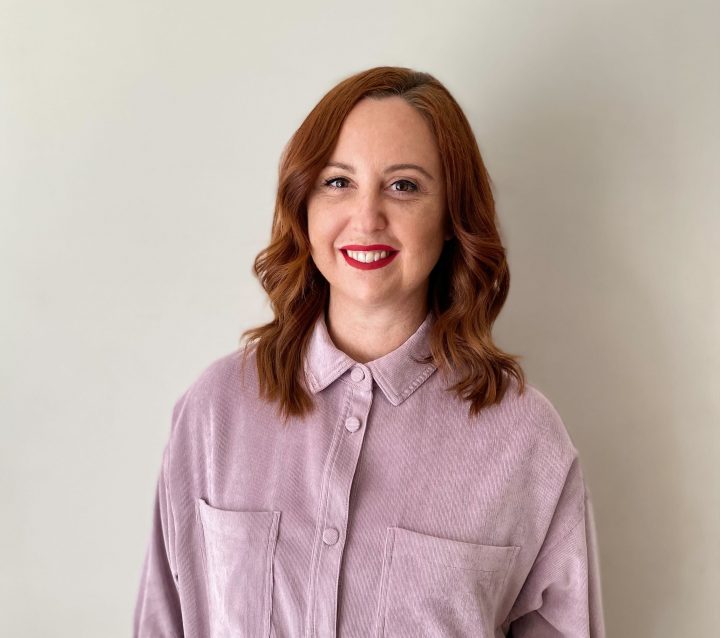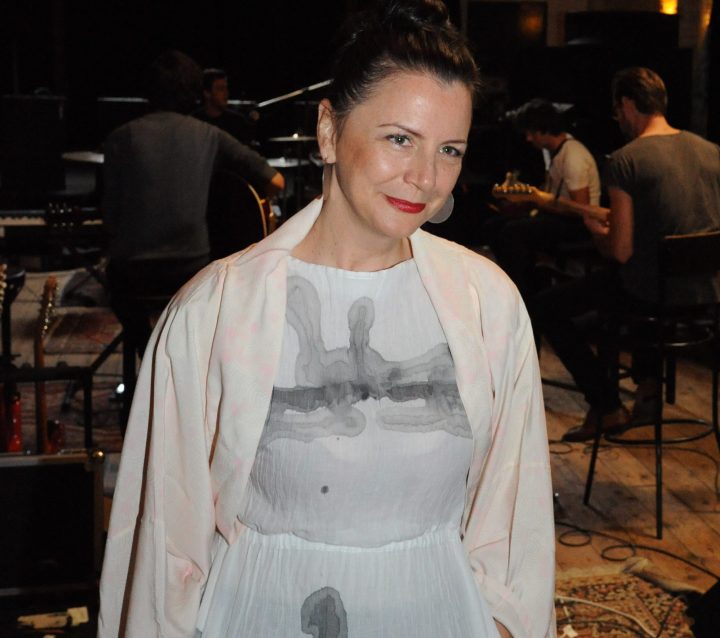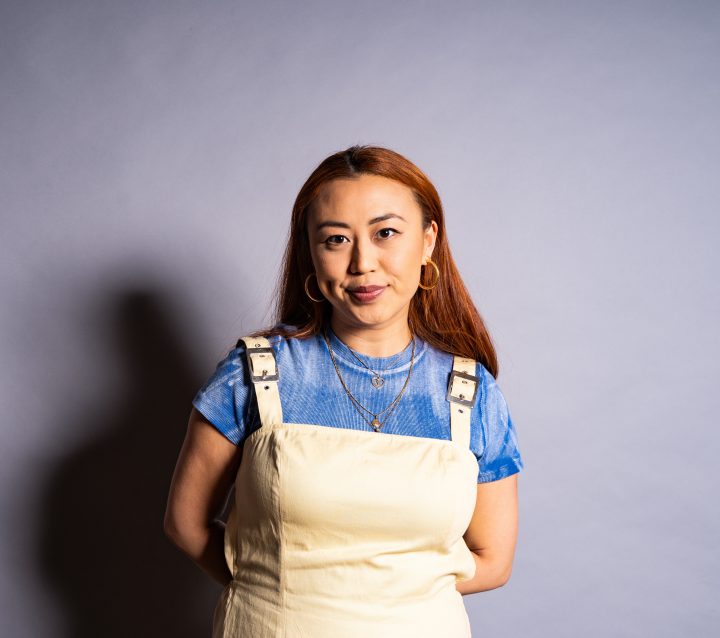
You are a woman of many talents, co-founder of SLAM and owner of Bakehouse Studios with your long term partner Quincy McLean. For those who are unaware of both SLAM and Bakehouse Studios, can you please tell us about both?

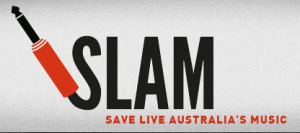
We started Bakehouse Studios 25 years ago. After spending time living in London with Quincy’s then band Blue Ruin, we returned and moved into the Nth Fitzroy studios in Bakehouse Lane. Later we took over the old Stable Sound in Hoddle Street. It’s a large old rambling building , an abandoned mansion from the turn of last century that became a cubby house for Melbourne’s musicians. These days we host rehearsals, recordings, film clips, live art, public art, immersive theatre and all sorts of events that keep us entertained.
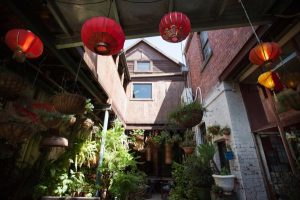 Downstairs at Bakehouse Studios, Richmond
Downstairs at Bakehouse Studios, Richmond
In 2010 activist group SLAM (Save Live Australia’s Music) was formed as a direct response to ‘unintended consequences’ of regulatory policy that equated live music with violence. Our venues were shutting down their live music programs and when our beloved Tote closed its doors, Quincy and I decided to organise a rally.
Our community was galvanised and 20,000 live music fans marched on parliament in what has been described the ‘largest cultural rally in Australia’s history’. Since then, I found myself swept up by this movement and have dedicated a few good years to regulatory reform and placing Live Music on the political agenda.
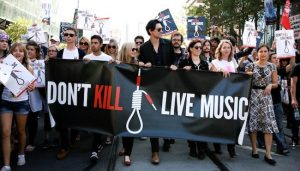 SLAM rally – the largest cultural protest in Australian history with 20 000 protesters.
SLAM rally – the largest cultural protest in Australian history with 20 000 protesters.
What artists do you work with/have worked with?
So many artists have come through the doors of Bakehouse or have supported the work I do with SLAM. Over the last 25 years, we have hosted thousands of locals and internationals. Some of my favourite artists became dear friends, like the Drones & My Disco.
Famous names and pivotal moments for Bakehouse include working with Nick Cave and the Bad Seeds, Cat Power, John Cale, ONJ, the MC5, the Saints, doing Ed Sheehan’s first ever gig in Australia, Courtney Barnett, Paul Kelly, Neil Finn, the Avalanches ……
 Cat Power
Cat Power
Describe a normal day in the life of Helen Marcou…
The only normal thing about my life is getting up and going to bed, sometimes that gets a little messy too…
In the last few days I have hosted an International Women’s Day breakfast. Set up rooms for Amanda Palmer, Hunters and Collectors, Spiderbait and ROCKWIZ, had a meeting with the British council, talked to politicians, the press, planned an art exhibition, driven kids around, made school lunches, spent time with my recently widowed mum, cooked for Angus’ 21st birthday party, mopped the floors at the studio and repotted the garden.
My days are fractured, I get tired and may preach self care to others, but need discipline to look after myself.
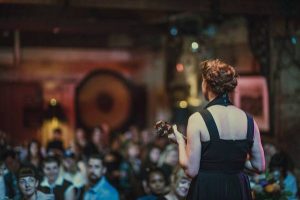 Amanda Palmer performing at Bakehouse Studios photography by Michelle Grace Hunder
Amanda Palmer performing at Bakehouse Studios photography by Michelle Grace Hunder
(www.michellegracehunder.com)
How did you get your start in the music industry? Did you choose to work in music or did it choose you?
At the age of 11 I went to my first gig, then at 14, I organised a show at my local high school .
I met my husband during the first wave of post punk in the early 80’s hanging around the now infamous ‘Crystal Ballroom ‘ in St Kilda. Going to gigs and music was intrinsic. He was a full time musician and we travelled the world together.
My day job was in hospitality and I ended up as a senior manager and worked as a consultant until our first baby came along 21 years ago. Quincy was already running Bakehouse and it seemed logical that I join him and we began a family business.
It took a few years to create a demarcation of who did what, but I was able to bring my skills into Bakehouse and have never looked back.
Have you got any advice for people wanting to start a career in the industry?
Get immersed in your scene, see as many local gigs as you can afford and if you can’t afford the ticket price, become a volunteer at festivals, events and organisations. A diploma in music industry does not necessarily lead to a vocation, but building and contributing to a community will see you in.
As for longevity in the music industry, my advice is still based on the same principles. The industry is made of of many small and micro businesses, people often use the cliche of describing it as an ‘Eco system’ but when margins are low and competition is high, putting time and effort into supporting those around you always pays off.
What issues/potential issues do you think the current Australian music industry face?
I believe that the Music Industry needs to put the artist at its core to survive. The system is skewed and often the industry generates income for everyone who provides an ancillary service, yet an artist still on average earn less than $11,000 per year on average.
Systemic and underlying sexism and few opportunities for people of colour, aboriginal Australians and marginalised people has always been a problem. Music tells our story and if half the population are left out of this narrative, we only hear the voices and stories of white cis men and lose our identity as a whole.
If you were to change one thing about the structure of the Australia industry, what would it be?
I’ve spent the last few years looking at barriers to participation and practice of live music especially regulatory frameworks and sexual assault and harassment. My utopian Live Music environment would include a healthy touring circuit, a growth in audiences through education and access and a shift in culture where patrons, staff and our performers can enjoy gigs with dignity and without fear of sexual harassment.
Have you had to overcome any challenges/adversity throughout your career? If so, can you tell us about them and how you approached them?
I don’t think I could do half the things I attempt without my partner Quincy’s support. I understand that our relationship is something out of the norm, but having a co collaborator to bounce off and encourage me at every step has enabled me to overcome my anxieties and fear of not being capable.
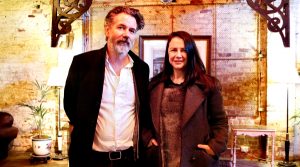 Quincy and Helen
Quincy and Helen
What tips would you give an artist trying to succeed in Australia? Is there a certain route they should take?
Don’t be put off by age or gender, continue with your creative output. Work with people who put you at the centre and in return respect and treat your colleagues, managers, staff with respect.
What does 2017 hold for you? Any exciting things that you can tell us about?
Today I’m going to fed square to be inducted into the ‘Victorian Women’s honour roll’ , it’s a surreal feeling even typing this. (editor’s note – this happened on March 6th when questions were answered – for more on this induction, please read this article from The Music).
In April I’ll be in Toronto giving a keynote at Music Week and in the middle of the year Bakehouse will be making another series of ‘the gift’ a collaboration and work experience program for RMIT students from the school of sound production and media.
The venue training pilot for sexual assault and harassment will roll out.
I’ll also be working with a number of visual artists and photographers on our public art program and I’ll also be involved in more peer assessment roles. Last year I was privileged to be selected as one of the judges of the Melbourne prize for music and on the panel for the Sidney Myer Arts fellowships.
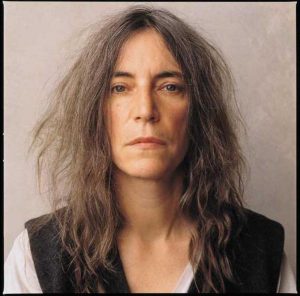 Patti Smith
Patti Smith
Who are your role models in the industry whether they be international/Australian?
Local role models include Kirsty Rivers, Dr Kate Shaw, Evelyn Morris, Hannah Fox
From the broader arts world, women that inspire me and support me include:
Holly Durant (contemporary dancer), Marieke Hardy , Tai Snaith, Patricia Piccinini, Pascale Gomes-McNabb
And advocates I really admire are : Jade Lillie & Esther Anatolitis
My all time hero is Patti Smith.
What’s your go-to Karaoke song?
Dreams by Fleetwood Mac.
More Interviews

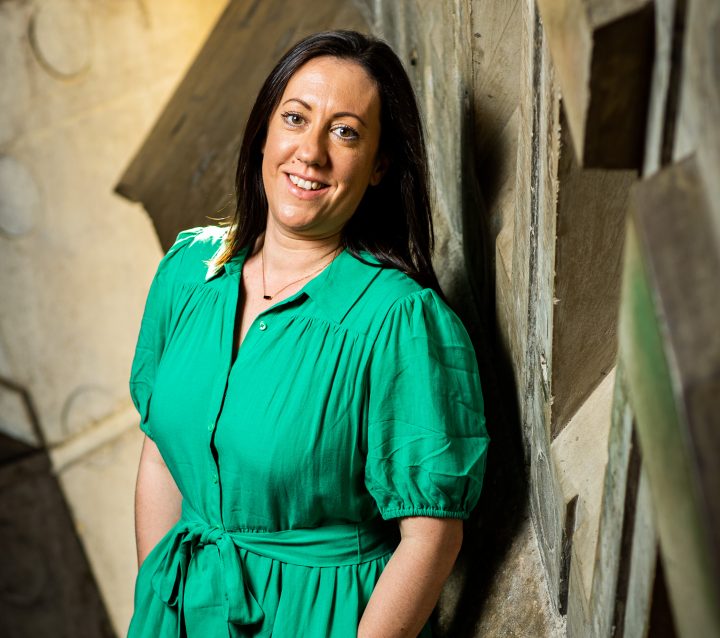
Phillippa Martin Reiter
Festival Producer // Vivid LIVE at Sydney Opera House // Contemporary Music
Phillippa Martin Reiter
Festival Producer // Vivid LIVE at Sydney Opera House // Contemporary Music
